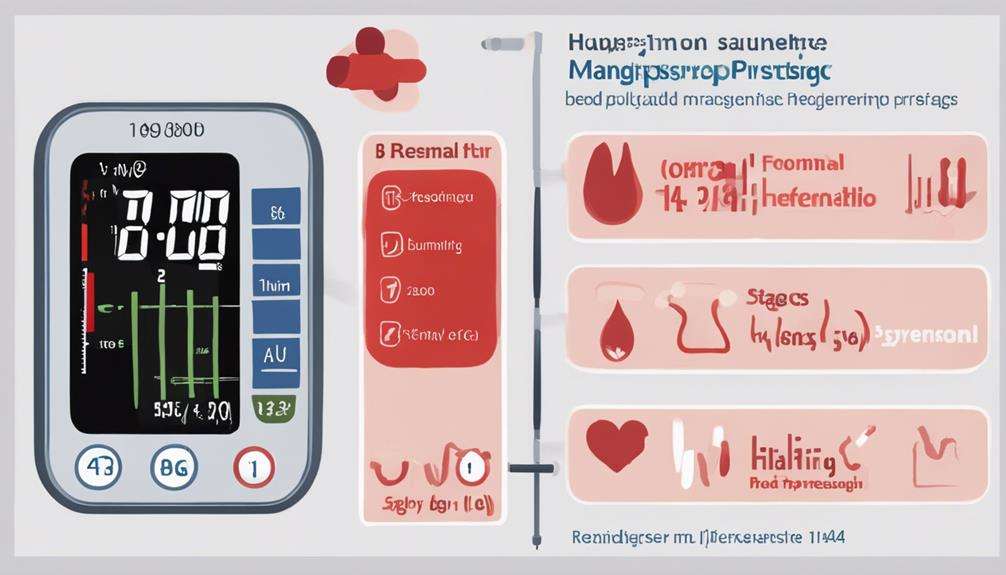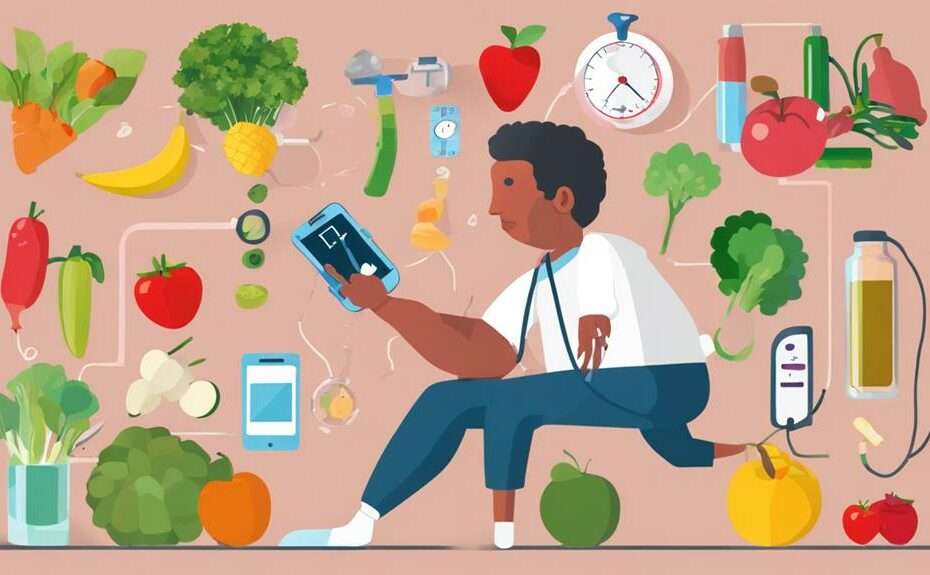You may not be aware that managing high blood pressure effectively involves implementing specific practices that can greatly impact your heart health.
From lifestyle adjustments to dietary changes and stress management techniques, there are key strategies that can help you take control of your hypertension.
By following these best practices consistently and seeking guidance from healthcare professionals, you can work towards improving your overall well-being and reducing the risks associated with high blood pressure.
Key Takeaways
- Maintain a healthy weight through lifestyle changes like diet and exercise.
- Reduce salt intake and increase potassium-rich foods for better blood pressure control.
- Regular physical activity, including aerobic and strength training, helps lower blood pressure.
- Practice stress management techniques like deep breathing and mindfulness for effective blood pressure management.
Lifestyle Modifications for Blood Pressure
To effectively manage high blood pressure, implementing lifestyle modifications is essential for improving overall health. Weight loss plays a critical role in reducing blood pressure, with each kilogram lost potentially lowering it by about 1 mm Hg.
Regular exercise is another key factor, as it can decrease blood pressure by 5-8 mm Hg. It's recommended to engage in a combination of aerobic exercises like walking or swimming and strength training activities like weight lifting.
Additionally, adopting a heart-healthy diet such as the DASH diet can contribute to reducing blood pressure. The DASH diet emphasizes whole grains, fruits, vegetables, and low-fat dairy. Managing sodium intake is equally important, with limiting it to 2,300 mg/day or less potentially lowering blood pressure by 5-6 mm Hg.
In addition, incorporating stress management techniques, quitting smoking, moderating alcohol consumption, and ensuring quality sleep are all beneficial lifestyle changes for effective blood pressure control.
Dietary Adjustments for Hypertension
Making adjustments to your dietary habits can greatly impact your blood pressure management, especially when focusing on key factors like reducing salt intake, incorporating potassium-rich foods, and following specific eating plans such as DASH (Dietary Approaches to Stop Hypertension).
Reducing salt intake to less than 2,300 mg per day is vital in lowering blood pressure and decreasing the risk of complications related to hypertension. Increasing potassium-rich foods, aiming for 3,500 to 5,000 mg per day, helps counteract the effects of sodium on blood pressure regulation. Following the DASH eating plan, which includes fruits, vegetables, whole grains, and low-fat dairy products, has been shown to effectively manage high blood pressure.
Moderating alcohol consumption, limiting it to less than one drink a day for women and two for men, is also recommended for individuals with hypertension. Additionally, incorporating fiber-rich foods like whole grains, fruits, and vegetables into your diet can further aid in controlling blood pressure and supporting overall cardiovascular health.
Importance of Regular Exercise

Regular exercise plays an important role in lowering blood pressure and promoting essential heart health. Engaging in physical activity helps lower blood pressure by approximately 5-8 mm Hg, contributing to better heart health outcomes. Both aerobic exercises such as walking or cycling and strength training exercises are beneficial for managing high blood pressure. Aim for at least 30 minutes of moderate physical activity daily to reduce the risk of hypertension.
Exercise is crucial in improving blood circulation, strengthening the heart, and enhancing overall cardiovascular fitness, which supports blood pressure control. Consistent physical activity also aids in weight management, stress reduction, and maintaining healthy blood pressure levels over time. By incorporating a mix of aerobic exercises and strength training into your routine, you can effectively manage high blood pressure and improve your heart health. Remember, staying active is an essential component in the holistic approach to managing high blood pressure.
Stress Management Techniques for BP
Implementing effective stress management techniques is essential for maintaining healthy blood pressure levels and overall cardiovascular well-being. Chronic stress can greatly impact high blood pressure by triggering the release of stress hormones like cortisol and adrenaline, leading to increased blood pressure levels.
To combat this, incorporating stress management strategies into your daily routine is important. Techniques such as deep breathing exercises, progressive muscle relaxation, and mindfulness meditation have been scientifically proven to lower blood pressure and reduce stress levels.
Additionally, engaging in regular physical activities like yoga, tai chi, or walking can help alleviate stress and improve your cardiovascular health, ultimately benefiting your blood pressure. Seeking social support from friends, family, or support groups can also play an important role in stress management. Emotional assistance and a strong support system can aid in coping with stressors, potentially lowering blood pressure levels.
Monitoring Blood Pressure at Home
To effectively monitor your blood pressure at home, utilize a reliable blood pressure monitoring device and establish a consistent routine for measurements.
Home blood pressure monitoring plays an important role in managing hypertension by allowing you to track your blood pressure readings regularly. This method helps in detecting patterns and trends that may not be apparent during occasional clinic visits.
Healthcare providers greatly benefit from the data obtained through home monitoring, as it provides valuable insights for better management of your condition. By keeping track of your blood pressure at home, you enable timely adjustments to medications and implementation of lifestyle interventions.
Consistent monitoring contributes to better blood pressure control, leading to improved overall health outcomes. Embracing this proactive approach empowers you in the management of your hypertension, ensuring that your health is continuously monitored and optimized.
Medication Adherence for Hypertension
As you focus on managing your high blood pressure through consistent monitoring at home, guaranteeing adherence to prescribed medications is fundamental for maintaining stable blood pressure levels and reducing the risk of complications.
Medication adherence plays a crucial role in controlling high blood pressure. Non-adherence to hypertension medication can result in uncontrolled blood pressure, increasing the likelihood of complications such as heart disease and stroke. Skipping doses or suddenly discontinuing medication can lead to worsening hypertension, potentially causing health emergencies.
It's essential to follow your healthcare provider's recommendations regarding your hypertension medication regimen. Consistent adherence to your prescribed medication regimen can have a significant impact on the management of your blood pressure. Before making any changes to your medication routine, consult with your healthcare providers to guarantee the management of your high blood pressure and reduce the risk of associated complications.
Understanding Blood Pressure Readings

When checking your blood pressure, pay attention to both numbers: systolic and diastolic.
A normal reading is around 120/80 mm Hg, while higher readings may indicate hypertension risk.
Understanding these numbers can guide you towards better cardiovascular health management.
Blood Pressure Basics
Understanding blood pressure readings involves interpreting the two numbers that make up the reading: systolic pressure and diastolic pressure. The systolic pressure, the top number, represents the force of blood against artery walls when the heart contracts. On the other hand, the diastolic pressure, the bottom number, indicates the force on the artery walls when the heart is at rest between beats.
Normal blood pressure is around 120/80 mm Hg, with readings above 130/80 mm Hg considered high. Hypertension, or high blood pressure, greatly raises the risk of heart disease, stroke, and kidney issues. Monitoring and understanding these numbers are important for effectively managing cardiovascular health and reducing the associated risks.
Reading Significance
To grasp the significance of blood pressure readings, understand that they consist of two numbers – systolic and diastolic – measured in millimeters of mercury (mm Hg).
The systolic number represents arterial pressure during heartbeats, while the diastolic number indicates pressure when the heart is at rest.
Normal blood pressure typically falls around 120/80 mm Hg, varying depending on age, health, and lifestyle. High blood pressure (hypertension) is diagnosed at 130/80 mm Hg or higher, elevating risks of heart disease and stroke.
Understanding blood pressure readings is important for monitoring and managing hypertension effectively. Regular readings help track changes and make sure they remain within a healthy range.
Stay vigilant in monitoring your blood pressure to protect your heart health.
Impact of Alcohol on High BP
Alcohol consumption greatly impacts high blood pressure, increasing the risk of hypertension and related complications. Excessive drinking can elevate blood pressure levels, putting strain on the heart and blood vessels. The American Heart Association advises limiting alcohol intake to one drink per day for women and two drinks per day for men to help manage high blood pressure.
It's important to emphasize that alcohol can interfere with blood pressure medications, potentially reducing their effectiveness or causing harmful interactions. Chronic heavy drinking not only worsens high blood pressure but also damages essential organs like the heart and liver, contributing to cardiovascular issues.
Smoking Cessation and Blood Pressure

Quitting smoking greatly reduces blood pressure levels and improves overall cardiovascular health. When you quit smoking, your blood pressure can drop by 5-10 mm Hg within just 20 minutes, benefiting your heart and blood vessels.
Smoking damages blood vessels, leading to increased heart rate and blood pressure due to the constriction caused by nicotine. Additionally, exposure to secondhand smoke can elevate blood pressure and raise the risk of heart disease. By quitting smoking, you eliminate these harmful effects and reduce the risks associated with hypertension.
Nicotine in cigarettes not only raises blood pressure levels but also contributes to the development of cardiovascular issues. Hence, smoking cessation is vital for enhancing your cardiovascular well-being and lessening hypertension risks.
Make the decision today to quit smoking and take a significant step towards better heart health and overall wellness.
Support Systems for Managing Hypertension
You can benefit greatly from family support when managing high blood pressure, as having a strong support system at home has been shown to positively impact hypertension management.
Additionally, the influence of friends on your health choices and habits shouldn't be underestimated, making it essential to surround yourself with individuals who encourage healthy behaviors.
Exploring community resources tailored to hypertension can provide you with valuable tools, information, and connections to further support your journey in managing high blood pressure.
Family Support Importance
Family support plays an important role in the effective management of high blood pressure by providing essential emotional backing, encouragement, and motivation. Involving family members in managing high blood pressure can improve adherence to treatment plans and lifestyle changes. They can assist in monitoring blood pressure, ensuring medication compliance, and engaging in healthy activities together.
The emotional support from family creates a positive environment that reduces stress, enhances overall well-being, and fosters successful hypertension management. By establishing a strong support system within the family, communication, understanding, and collaboration can be enhanced, leading to better control of hypertension and improved health outcomes.
Family involvement is vital in creating a supportive network that aids in managing high blood pressure effectively.
Friends Impact on Health
Supportive friends can greatly impact an individual's ability to effectively manage hypertension through encouragement and accountability. Social connections play an important role in reducing stress levels, ultimately aiding in lowering blood pressure and improving overall health outcomes.
Friends can also help promote healthy habits such as regular exercise and balanced nutrition, essential for controlling high blood pressure. Additionally, having a strong support system can lead to better medication adherence and facilitate necessary lifestyle changes, resulting in more effective hypertension management.
Emotional support, motivation, and companionship provided by friends are essential for maintaining a heart-healthy lifestyle and effectively managing high blood pressure. Building and nurturing these relationships can significantly contribute to your journey towards better health.
Community Resources for Hypertension
Building a network of community resources for hypertension can greatly enhance your journey towards effective management and control of high blood pressure. Community resources play an essential role in supporting individuals with hypertension by offering education, guidance, and motivation.
Support groups, online forums, and educational seminars tailored to hypertension management can provide valuable information and a sense of community. These resources often grant access to healthcare professionals, nutritionists, and exercise specialists who can offer personalized advice to help lower blood pressure.
Engaging with community resources not only improves treatment adherence but also empowers individuals to take control of their health. By utilizing these support systems, you can enhance your overall well-being and stay informed and connected on your path to managing hypertension effectively.
Frequently Asked Questions
What Is the Proper Management of High Blood Pressure?
To manage high blood pressure effectively, you should focus on lifestyle changes, medication adherence, dietary adjustments, exercise routines, stress management, monitoring progress, and considering alternative therapies. Collaborate with healthcare professionals to tailor a plan that suits your needs.
What Is the Best Way to Deal With High Blood Pressure?
To effectively manage high blood pressure, focus on lifestyle changes, dietary modifications, exercise routine, stress management, medication options, monitoring progress, and seeking professional help. Consistency in these areas is key to controlling and improving your blood pressure levels.
How Can I Bring My BP Down Quickly?
To bring your blood pressure down quickly, try lifestyle changes like deep breathing, brisk walking, and eating potassium-rich foods. Stay hydrated and manage stress with relaxation techniques. Consult with a healthcare provider for medication options and personalized advice.
What Is the Best Practice for Blood Pressure?
To manage blood pressure effectively, focus on dietary modifications, an exercise regimen, stress reduction, medication adherence, lifestyle changes, monitoring progress, and regular check-ups. These practices help control blood pressure and promote overall well-being.
Conclusion
To sum up, by implementing these 10 best practices for managing high blood pressure, you can take control of your heart health and reduce the risks associated with hypertension. Remember, 'an ounce of prevention is worth a pound of cure.'
By making small lifestyle changes, monitoring your blood pressure regularly, and seeking support from healthcare professionals, you can improve your quality of life and decrease the impact of high blood pressure on your overall well-being.
Stay proactive and committed to managing your hypertension effectively.






